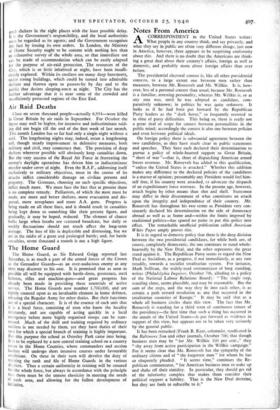Notes From America
A. CORRESPONDENT in the United States writes: What people in any country think, and say privately, and what they say in public are often very different things; just now in America, however, there appears to be surprising conformity about this. And there is no doubt that the Americans are think- ing a great deal about their country's affairs, foreign as well as domestic, and probably more about foreign affairs than ever before.
The presidential electoral contest is, like all other presidential contests, to a large extent one between men rather than measures, between Mr. Roosevelt and Mr. Willkie. It is, how- ever, less of a personal contest than usual, because Mr. Roosevelt is a familiar, arresting personality, whereas Mr. Willkie is, or at any rate was, until he was adopted as candidate, com- paratively unknown; in politics he was quite unknown. It looks as if he had been put forward by the Republican Party leaders as the dark horse," so frequently resorted to in time of party difficulties. This being so, there is really not a great deal of scope for contest between personalities in the public mind; accordingly the contest is also one between policies and even between political ideals.
On foreign policy there is substantial agreement between the two candidates, as they have made clear in public statements and speeches. They have each declared their determination to pursue a policy of whole-hearted support to Great Britain, "short of war "—that is, short of dispatching American armed forces overseas. Mr. Roosevelt has added to this qualification, "unless the United States is attacked." Whether this addition makes any difference to the declared policies of the candidates is a matter of opinion; presumably any President would feel him- self free, if. his country were attacked, to advocate the dispatch of an expeditionary force overseas. In the present age, however, attack begins by other means than shot and shell Statesmen may differ in their discernment of what constitutes an attack upon the integrity and independence of their country. Mr. Roosevelt has throughout his two terms as President very con- sistently declared his determination on the side of democracy abroad as well as at home and—within the limits imposed by traditional politics—has spared no pains to put this 'policy into effect. The remarkable unofficial publication called American White Paper amply proves this.
It is in regard to domestic policy that there is the deep division between the two presidential candidates, for while both are, of course, completely democratic, the one continues to stand whole- heartedly by the New Deal, and the other represents the great stand against it. The Republican Party seems to regard the New Deal as Socialism, as a progress, if not immediately, at any rate steadily, towards a socialist totalitarian system. For instance, Mark Sullivan, the widely-read commentator of long standing, writes (Philadelphia Inquirer, October 7th, alluding to a policy of the National Labour Relations Board): "The single step, standing alone, seems plausible, and may be reasonable. But the sum of the steps, and the way they fit into each other, is as certain a path toward revolution as any that occurred in the totalitarian countries of Europe." It may be said that as a whole all business circles share this view. The fact that Mr. Roosevelt is standing for a third term of continuous tenure of the presidency—the first time that such a thing has occurred in the annals of the United States—is put forward as evidence in support of this view, but appears not to be taken very seriously by the general public. It has been remarked (Frank R. Kent, columnist, syndicated in the Baltimore Sun and other journals, October 7th) that though business men may be "for Mr. Willkie 100 per cent.," they "shy away from active participation in the Willkie campaign." For it seems clear that Mr. Roosevelt has the sympathy of the ordinary citizen and of "the forgotten man" for whom he has so eloquently pleaded. "It seems time," continues the Re- publican commentator, "for American business men to wake up and shake off their timidity. In particular, they should get rid of the inferiority complex that makes them consider their political support a liability. That is the New Deal doctrine, but they are fools to subscribe to it."


























 Previous page
Previous page